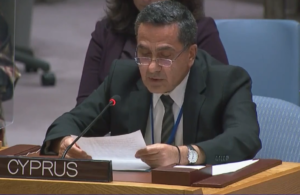 UN Security Council Open Debate on Ending Cycles of Sexual Violence in Conflict, under the item “Women and peace and security”
UN Security Council Open Debate on Ending Cycles of Sexual Violence in Conflict, under the item “Women and peace and security”
United Nations, 13 April 2022
Thank you, Madam President, for organizing this important debate. My statement will be complementing that of the European Union, to which we fully subscribe.
Sexual violence as a weapon of war cannot be considered as an inevitable consequence of armed conflicts, despite the fact that the history of this disturbing phenomenon is as long as that of war itself. And despite the increased attention to the Women, Peace and Security agenda, we observe that significant gaps remain in effectively addressing this phenomenon.
Sexual violence in conflict bears significant adverse intergenerational economic and political impacts for survivors and their families. It exacerbates the displacement of population and the destruction of communities, and undermines reconstruction efforts and the transition to stable, secure and peaceful societies. Covid-19 has further amplified gender-based inequality, as the root cause and driver of sexual violence both in times of conflict and in peace.
Strategies to address sexual violence in conflict have mainly focused on perpetrator accountability and survivor support, after violence has already occurred. While these are vital, we need also to establish solid prevention measures, to stop sexual violence from occurring in the first place. CRSV is preventable by systematic action.
Placing prevention at the core of our approach, requires a multi-faceted, multi-level and multi-dimensional strategy – one that includes addressing the root causes of conflict itself. Investing in strengthening the rule of law and State institutions, in economic stability, infrastructure and social development, as well as addressing deep-rooted inequalities and ensuring women’s participation in all spheres, are central to this approach.
At the same time, foundational to a prevention-centered approach, would be the recognition of the importance of two particular aspects: firstly, the continuum of sexual violence. While CRSV takes place in conflict settings, it still occurs within the broader context of gender-based violence and exists within a global “climate of impunity”, where gender inequality and women’s disempowerment play a highly significant role in its perpetuation.
Secondly, the primacy of survivors. Survivors should not be a voice alone – they must become the architects of strategies aimed at addressing CRSV. A survivor-centered approach cannot focus solely on providing support or promoting women’s empowerment. It must also address the economic, social and political structures that underpin their disempowerment.
Madam President,
Post conflict situations provide an opportunity for the transformation of societal structures in ways that ensure greater enjoyment of women’s human rights. Yet women continue to be excluded from conflict prevention efforts, post-conflict transition and reconstruction processes. Post-conflict societies recover and rebuild more effectively when women participate in reconstruction efforts and their experiences in conflict are addressed. Responding to CRSV should include women in developing solutions to the factors that place them at risk.
History, including in the case of Cyprus, has shown that the role of women in conflict resolution, post-conflict rehabilitation, reconciliation and sustainable peace is key. At the same time, the violence and degradation suffered by women in conflict situations, remain largely unaddressed. As a country that has experienced the atrocity of CRSV first-hand, Cyprus attaches great importance to the elimination of all forms of gender-based violence and joins calls to accelerate efforts towards their elimination.
The Government of Cyprus has taken significant steps towards the elimination of gender-based violence, and the promotion of gender equality and women’s empowerment, through the adoption of a number of National Action Plans and Strategies in the field of gender equality, and of new laws tackling gender inequalities and the establishment of independent equality bodies.
Madam President,
The crucial role of women in the prevention and resolution of conflicts, the need for their full, equal and meaningful participation and involvement in all efforts for the maintenance of peace and security, have been widely recognized, particularly by this organization. What remains is for this to be translated into practice. Sexual violence in conflict is a grave human rights violation which constitutes a threat to international peace and security. Curbing the root causes of CRSV, therefore, is not only a moral but a strategic imperative.
I thank you.